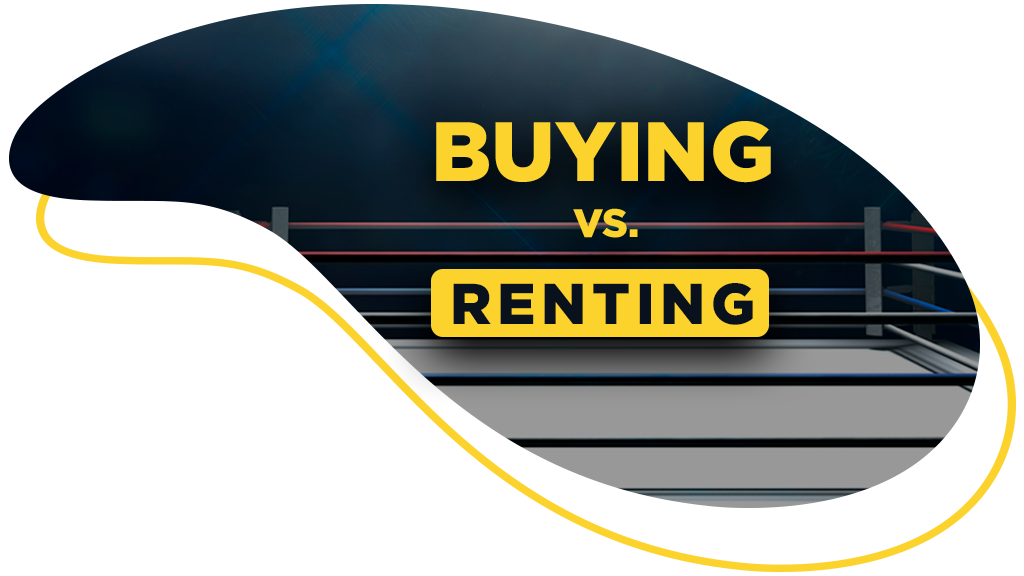To buy or to rent a house— have you ever asked this question? The dream of homeownership can sometimes seem so far away that we don’t even consider the possibility.
As we’ve highlighted before, property ownership goes hand-in-hand with wealth building in the US and plays a key role in the development of the LatinX community. For this reason, it is important to evaluate the pros and cons of both renting and buying so that you can make an informed decision when the time is right for you.
What are the criteria that will be important to consider? Are you ready? Can you afford all of the upfront costs plus the mortgage installments? Do you want to take root where you are? These questions must be answered even before you start to browse listings.
Rent vs. Buy
A good strategy is to weigh the pros and cons of either option.
Advantages of Renting
- Lease contracts have a deadline and you can move if the place doesn’t work for you.
- Getting out of a rented house can be faster than selling a property, which is useful in the event of a broken relationship or any other circumstance that might call for change.
- You don’t have to deal with maintenance costs.
- You can rent a furnished house, which saves money and time.
- You don’t have to pay mortgage or legal fees.
- You don’t have to worry about valuations and devaluations in the real estate market.
Disadvantages of Renting
- Your landlord may decide to increase your rent at lease renewal.
- You cannot renovate the property without your landlord’s approval.
- You have no control over how your home is maintained, so repairs may take longer than you would like.
- Your landlord may decide not to renew the lease and you will need to move.
Advantages of Homeownership
- You have the security of a permanent home.
- The decoration and renovations in the house are entirely up to you.
- The speed of necessary repairs is entirely up to you.
- After you pay off the mortgage, you’ll have a house that is all your own.
- Even though it is your home, a property is always an investment, if prices go up, you will benefit.
Disadvantages of Homeownership
- Saving up for a downpayment can be difficult and time-consuming.
- You have to pay mortgage, legal fees, homeowners insurance and other closing costs that should be part of your budget calculation.
- If repairs are needed, you will have to pay the bill.
- Just as you can benefit if the property appreciates in value, you bear the loss of devaluation as well. This can even affect refinancing, if necessary.
- If you need to move to another city, you will need to sell the house or take care of a long-distance rental.
Financially speaking… Is it better to buy or to rent?
There are so many theories, techniques, calculations, finance books, youtube channels, and opinions that abound, each with a definitive formula on what is best to do with your money. What is best for one person, however, may not necessarily be the case for another.
Of course, renting is an easy, fast and practical option. You can find a property, close a contract and move in a few days— all the more easier if it’s furnished.
Buying is a much more complex decision. It depends on many factors, both financial and personal, as well as your desire to stay in a single place for a long time.
Is it worth buying a house?
If you’re still evaluating your options, ask yourself the following questions:
- Where do you see yourself in two years? Or five? Evaluate the length of a mortgage versus how long you are willing to stay in the same house.
- Will you be able to afford the maintenance costs if something needs fixing?
- How much money will be left after paying off mortgage repayments and other extra costs? Will you be comfortable with those costs? Otherwise, investing the money while paying rent might be the better idea, so that you can save up to increase your down payment.
- Have you checked the criteria for home purchase incentive programs? Do you know what federal programs are available to you?
Is renting really a waste of money?
For a few years now, this is a maxim that has become increasingly popular, but like all advice on the internet: it depends. The main argument is that paying rent is a waste of money because you are effectively paying your landlord’s mortgage and not your own.
While this may be true on some points, the argument ignores some very important details. Although the rent is often close to a mortgage payment, buying a home involves upfront costs that you may not be able to afford.
Keep in mind that in addition to the mortgage, insurance, and brokerage costs, you may still need to pay for the move, buy furniture, appliances, and pay for immediate updates or renovations to the property. It is good to consider ALL costs before making any decisions.
Rent guarantees a home and may be the best strategy for living comfortably while saving the money needed for the upfront costs of a purchase a few years from now.
Are you ready to buy your house?
If you believe that buying is the best solution for you and feel ready for a new home, we can help you confirm. Check out these signs that you might be ready to buy a house:
1. You always pay your rent on time. If your rent is comfortably adequate for your monthly income, you may be ready to pay your mortgage payments. The question is: how much do you have for a downpayment?
2. You have a credit score of at least 580 or more.
3. Your accounts are all up to date and your income is stable. You need to prove financial stability to qualify for a mortgage, and you have to be prepared for closing costs, taxes and utilities, as well as home or appliance repairs. It is recommended to have between 3 and 6 months of expenses saved to avoid financial distress in an unforeseen event, such as losing your job.
4. Are you ready to put down roots? Evaluate the country, city and neighborhood you want to live in for years to come.
5. You are concerned about rent increases. Your rent is conditioned by the market and your landlord’s wishes. The value of the installment of a loan can be defined and fixed, which can give you more peace of mind and stability.
6. You’re prepared to cut spending and change habits. Buying a home is a tough commitment to keep, which means you may need to cut spending to secure your payments. In addition, a new home can increase your maintenance and cleaning costs and increase your time and attention.
7. You want to start building equity. With every mortgage payment, you increase your equity a little bit.
8. You are willing to research and study about mortgages. Knowing your options, your rights and duties regarding the mortgage can make all the difference when buying your home. Don’t leave this important step to others.
Meta description:
To buy or to rent? With property ownership going hand-in-hand with wealth building, it is important to evaluate the pros and cons of both so you can make an informed decision.








